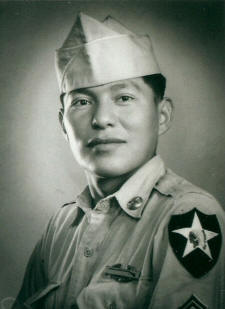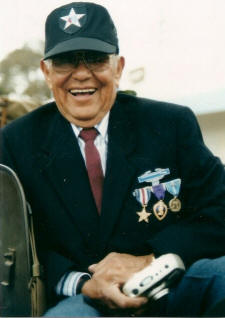|
We need your help to keep the KWE online. This website
runs on outdated technology. We need to migrate this website to a modern
platform, which also will be easier to navigate and maintain. If you value this resource and want to honor our veterans by keeping their stories online
in the future, please donate now.
For more information, click here.
|
|||||||||||||||
 |
|||||||||||||||
| Back to "Memoirs" Index page | |||||||||||||||
Marco Yazzie BegayNative American Indian - "When the Chinese attacked, artillery came first. Closer and closer, the artillery rained down on us, making the ground shake, just like an earthquake. Then there was the sound of the bugle and drums, and the screaming of Chinese soldiers as they attacked. " - Marco Begay
|
|||||||||||||||
Memoir Contents:BiographyMarco Begay was born in Ganado, Arizona, where he was raised on the Navajo Indian reservation. He attended St. Michael's Catholic grade school and later joined the U.S. Army Infantry in 1946. He was sent overseas to Germany and was stationed with Fox Company, 26th Regiment, Light Weapons Assault crewman (MOS 1745). While in Germany, he guarded Nazi prisoners of war at the Nuremberg trials. In 1949 he was discharged from the Army, and he returned home to Arizona. In 1950, he was recalled back into the service for the Korean War. He served in C Company, 23rd Infantry Regiment, 2nd Infantry Division from August 24, 1950 to October 4, 1951. He received the Silver Star on 20 May 1951 for action in the vicinity of Hangye, Korea; a Purple Heart on August 24, 1951 on Bloody Ridge; combat infantryman's badge; Korean Service Medal with three bronze stars; and three presidential unit citations for -- (1) the Battle of Twin Tunnels, (2) Chipyong-ni, where he was surrounded by five Chinese Divisions February 13-15, 1951, and (3) Hongchon. He also received two Republic of Korea Presidential Unit Citations, one for the Naktong River line and the other for Korea 1950-52 (23rd Infantry cited). Following five years in the Army he worked for the Santa Fe Railroad to repair railroad tracks between Barstow, California and Las Vegas, Nevada. He used his G.I. Bill to attend the National Trade School in downtown Los Angeles. After learning the trade of machinist, he was hired by the Douglas Aircraft Company, in Santa Monica, California, where he was involved in the building of military aircraft and commercial jetliners. He also worked on missiles and the Saturn rocket booster, which was used to put a man on the moon. He was a member of the team that built the SKYLAB Space Station. When the McDonnell Douglas Aircraft Company in Santa Monica closed in the early 1970s, he transferred to the McDonnell Douglas Astronautics Company in Huntington Beach, California. While working there, he helped make C-17 cargo jet parts, F-15 fighter jet parts, Space Station parts, and Delta rocket boosters. He retired from McDonnell Douglas after working there for 38 years. Personal Experiences from the Korean WarOn the ship going to Korea, I saw the soldiers throwing money overboard. I walked up to one of the soldiers ad said, "Why are you throwing your money away?" He said, "It's bad luck to take money into battle." I wished I had a net that night, to catch all of that money going into the ocean. When we arrived in Korea, some of the soldiers got tired of eating the same C-rations, and began to throw them away on the ground. A buddy of mine and I were at the end of the line marching to our positions. We began to pick up the discarded C-rations and put them in our backpacks. Soon after that, we were in a firefight. After the firefight was over, we were eating our C-rations in a foxhole. Some of the troops didn't have any food to eat. When someone found out that we had the food that had been thrown away, we had to pass out the food to the rest of the troops to keep them from going hungry. Walking by a campsite, some soldiers found some corn in a cornfield. They removed the cornhusks and put the corn in the fire. I said, "You are burning the corn!" I told them to leave the husks on the corn while it was cooking, to avoid burning the corn. We would also save bacon grease, in case we found some eggs to cook. If we found some guy who had a jeep or a truck, we would put the C-rations on the exhaust to have a hot meal. When the 187th RCT Airborne dropped inside North Korea, we fought the enemy all night long to reach them. After that we hooked up to relieve them. I met one Airborne soldier who said, "Hey Chief, is this how your people killed the white people?" as he cut off the head of a Chinese soldier. He said, "I'm going to take this head home with me." I said, "You're one crazy white man!" as he put the head inside his bag. Once, a new replacement soldier was approaching the front line. He kept saying, "Where's the front line, where's the front line?" He walked up past a small rise, and was shot dead by sniper fire. One soldier shot himself in the foot as he was getting out of a truck, just to get out of the war. During one of the firefights, a soldier took a bullet to the helmet, so he removed the helmet from his head to take a look, and was shot in the head. During the winter of 1951, one soldier left his boots outside of the foxhole he was in, so that he could freeze his feet to get out of the war. When the Chinese attacked, artillery came first. Closer and closer, the artillery rained down on us, making the ground shake, just like an earthquake. Then there was the sound of the bugle and drums, and the screaming of Chinese soldiers as they attacked. It was so cold that a water-cooled machine gun froze up because the tank was filled with water. There was one red-headed kid that was so scared inside the foxhole that he didn't want to shoot back at the Chinese. I said, "I'm going to grab my hand grenade and blow you up!", so the red-headed kid got up and started firing back at the enemy. Some of the fighting was hand-to-hand combat. One soldier was loading a bazooka, and he fired the bazooka so fast, he didn't have time to move his hand out of the way. The exhaust of the bazooka took off his hand, so I tied off his wrist to stop the bleeding. In the end, the Air Force saved our lives. They used fighters, fighter-bombers and cargo planes to airdrop ammo, food, and supplies. I called them angels coming down from heaven to help us in need. One time, a few of the soldiers found a small abandoned house for us to use as a place to sleep for the night. They used coal or charcoal to warm the house, but they didn't realize that it would create carbon monoxide (an odorless, poisonous gas). The next thing that happened, I was up in heaven, with nothing but white clouds everywhere. I started to walk up to the gates, and an angel spoke to me. He said, "You're too young to die! It's not your time to die, so we must send you back." I stepped back, and I fell through the white clouds, spinning all the way down. As I hit the ground, I woke up; and I sat up and started to throw up. A blanket covered my body, and I was between the dead soldiers next to me. One soldier said, "Hey Chief, put some food inside of you, and let's get back to the war!" Walking up a hill one day, someone dropped a smoke grenade on the ground. I picked it up, and pulled the pin on the grenade and threw it back down the hill. Next thing, I hear a soldier screaming, "The Chinese are attacking!" The soldier was bathing down below. My punishment for throwing the smoke grenade was to fill all the canteens up with water for the troops. After the Korean War, the nightmares never stopped. You never forget all the Chinese soldiers you have killed. The war will never end until the day you die. When I am sleeping, the Chinese soldiers surround my bed looking down at me. One of the Chinese soldiers put his hand out to me. I said to myself, "If I shake his hand I will die in my sleep." In another nightmare, I cut down three Chinese soldiers running in front of me, and one of the soldiers said, "Why did you kill us? We're not dead yet!" Silver Star Citation
Presidential Unit Citation
|
|||||||||||||||
|
|||||||||||||||
 |
|||||||||||||||



